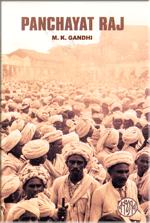
P.O. SEVAGRAM, DIST.WARDHA 442102, MS, INDIA. Phone: 91-7152-284753
FOUNDED BY MAHATMA GANDHI IN 1936
Panchayat Raj

NATURE CURE
Written by : M. K. Gandhi
Table of Contents
- Publisher's Note
- Why The Village Movement?
- Panchayats in Pre-Independence Days
- Panchayats in Independent India
- My Idea of Village Swaraj
- An Ideal Village
- Non-violent Rural Economy
- All-round Village Development
- Village Sanitation
- Rural Medical Relief
- Revival of Village Industries
- Charkha In The Villages
- Other Village Industries
- Duty of Congress Ministries
- Co-operative Cattle Farming
- Village Exhibitions
- Lok Sevak Sangh
- Samagra Gramseva
- Shanti Dals in Villages
About This Book
Written by : M. K. Gandhi
Compiled by : R. K. Prabhu
First Edition :10,000 copies, February 1959
I.S.B.N :81-7229-139-6
Printed and Published by :Jitendra T. Desai,
Navajivan Mudranalaya,
Ahemadabad-380014
India.
© Navajivan Trust, 1960
Download
Chapter-18: Shanti Dals in Villages
Some time ago an attempt was made, at my instance, to form shanti dals
but nothing came of it. This lesson, however, was learnt that the
membership, in its very nature, of such organizations could not be large.
Ordinarily, the efficient running of a large volunteer corps based on force
implies the possibility of the use of force in the event of breach of
discipline. In such bodies little or no stress is laid on a man's character.
Physique is the chief factor. The contrary must obtain in non-violent bodies
in which character or soul force must mean everything and physique must take
second place. It is difficult to find many such persons. That is why
non-violent corps must be small, if they are to be efficient. Such brigades
may be scattered all over; there may be one each for a village or a
mohalla. The members must know one another well. Each corps will
select its own head. All the members will have the same status, but where
everyone is doing the same work there must be one person under whose
discipline all must come, or else the work will suffer. Where there are two
or more brigades the leaders must consult among themselves and decide on a
common line of action. In that way alone lies success.
If non-violent volunteer corps are formed on the above lines, they can easily
stop trouble. These corps will not require all the physical training given
in akhadas, but a certain part of it will be necessary.
One thing, however, should be common to members of all such organizations and
that is implicit faith in God. He is the only companion and doer. Without
faith in Him these Peace Brigades will be lifeless. By whatever name one
calls God, one must realize that one can only work through His strength.
Such a man will never take another's life. He will allow himself, if need
be, to be killed and thereby live through his victory over death.
The mind of the man in whose life the realization of this law has become a
living reality will not be bewildered in crisis. He will instinctively know
the right way to act.
In spite, however, of what I have said above, I would like to give some rules
culled from my own experience.
- A volunteer may not carry any weapons.
- The members of a corps must be easily recognizable.
- Every volunteer must carry bandages, scissors, needle and thread, surgical knife, etc. for rendering first aid.
- He should know how to carry and remove the wounded.
- Heshould know how to put out fires, how to enter a fire area without getting burnt, how to climb heights for rescue work and descend safely with or without his charge.
- He should be well acquainted with all the residents of his locality. This is a service in itself.
- He should recite Ramnama ceaselessly in his heart and persuade others who believe to do likewise.
Man often repeats the name of God parrot-wise and expects fruit from so doing. The true seeker must have that living faith which will not only dispel the untruth of parrot-wise repetition from within him but also from the hearts of others.
Harijan, 5-5-1946